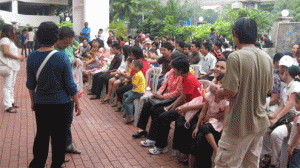Jaloon Htaw, Independent Mon News Agency – Thousands of migrants from Burma illegally working in Malaysia have suspended the process of applying for ‘legal work permits’ at the Burmese (Myanmar) Embassy due to the exorbitant costs and lack of legal guarantees from Malaysia’s Ministry of Labour.
 According to Burmese migrant workers, they are still waiting to know if they will face fines after applying for the permits. Currently, the workers are refusing to apply for the documents because the fees are expensive and offer no specific guarantees for workers.
According to Burmese migrant workers, they are still waiting to know if they will face fines after applying for the permits. Currently, the workers are refusing to apply for the documents because the fees are expensive and offer no specific guarantees for workers.
“Many migrant workers don’t want to make the work permit. They have to pay 4,500 Ringgit (1.2 million Kyat) for each person. It is too much. They worry the agents will trick them. Nobody believes the Malaysian government’s guarantee for this work permit. As illegal workers, we could be arrested and deported back to the Thai border,” said Ko Aung, a migrant worker.
During the first week of June, Malaysian newspapers carried the announcement that all foreign migrant workers in Malaysia need to register for legal work permits starting from July 11. However, workers have not been told of any legal agreement between the Malaysian and Burmese (Myanmar) governments on the issue.
But migrant workers have noticed that there has recently been an increase in arrests. They suspect that the arrests are more or less related to migrants applying for work permits.
“Now, we see there are more and more arrests. I think this is new pressure to get migrants to make the [work permit] cards. I think even though there is a fear of arrests, the migrant workers will not apply for the documents,” added Ko Aung.
Migrant workers interested in applying for work permits need to contact Maha-nan Burmese Restaurant and give all of their information and contact details. Then, agents will proceed with the information to the Burmese Embassy in Kuala Lumpur, the capital of Malaysia, said a coordinator for Mon migrant workers, Mehm Thuu Mon.
“I think the embassy needs to talk to employers because the workers do not trust the process. If the Malaysian government will really agree to allow these migrant workers to work legally, the government should announce something,” said Mehm Thuu Mon.
He said that now many workers suspect the process is a trick, and they worry they will be lied to by agents after being asked to pay large amounts of money. In Malaysia, Burmese migrant workers, including many ethnic workers, are employed in construction industries, restaurants, mechanic shops, and computer shops.
In 2010, according to Malaysia’s immigration office, there were 200,000 migrant workers in Malaysia, but only one-third of them had legal documents or passports to work in Malaysia. The remaining number had no documents allowing them to be in Malaysia.
The Malaysian government also announced on 1 June it would suspend the issuing of employment visas for all workers from foreign countries for six months.



